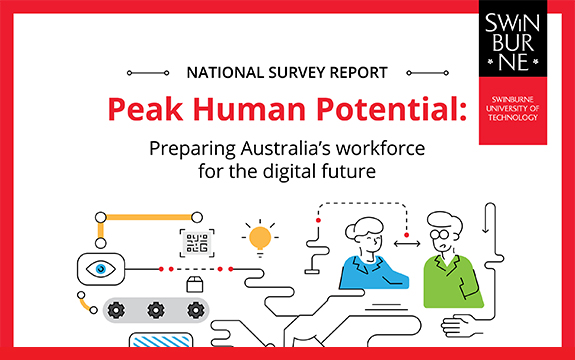
Dr Sean Gallagher says learning and work need to converge to prepare workers for the continuous and rapidly changing work of the digital future.
Digital disruption of the workplace will compel a radical reinvention of how we educate and train workers for the future of work, according to a new report published by Swinburne's Centre for the New Workforce.
The report off is based on a national survey of 1,000 working Australians – from CEOs to bus drivers, full-time and freelance workers. It reveals that workers increasingly value social competencies and learning on the job, suggesting a need to challenge orthodox approaches to learning.
Titled 'Peak Human Potential – Preparing Australia's workforce for the digital future', the report states that workers recognise the need to capitalise on their human qualities to avoid being displaced by technology.
"The more digital our workplaces become, the more human we need to be as workers. Workers understand that social competencies – such as collaboration, empathy and entrepreneurial skills – are uniquely human and less vulnerable to being displaced by sophisticated artificial intelligence (AI) and automation technologies," Director of the Centre for the New Workforce and report author Dr Sean Gallagher says.
"Our findings also show that, to prepare to work in digital environments, Australian workers prefer learning on the job. The more digitally disrupted their industry, the more workers prefer to learn at work."
"Lift and shift"
To prepare workers for the continuous and rapidly changing work of the digital future, Dr Gallagher says, learning and work need to converge.
"Digital disruption of work is taking place in the workplace, not in the classroom. In this report, we propose a new approach called 'learning-integrated work', where students and workers alike are immersed and learn in disrupted work environments."
"First, we need to lift all workers into the digital economy by providing them basic digital training.
"Then, we need to shift learning into future workplaces by trialling new learning partnerships between education institutions and employers," he says.
In support of the report's findings, CEO of TAFE Directors Australia, Craig Robertson, says the Vocational Education and Training (VET) sector is well placed to deliver many of the digital skills workers need for the future of work, especially as part of a more integrated education system.
"All students and all workers need to have future work skills. To build a workforce for the future of work, we need more integration between VET and higher education sectors.
"At the same time, we need to reimagine the traditional relationship of education institutions and employers and bring them closer together.
"I applaud the report's recommendation that we need to begin immersing learning into future workplaces by bringing education providers and employers together to prepare workers," Mr Robertson says.
"Currently, the VET sector is highly focused on skills that prepare workers for specific jobs, yet most workplaces are far more dynamic than what VET qualification structures assume. This disconnect will only increase with digital disruption of the workplace. We need to prepare students, not just with the right skills, but also with social competencies developed in digital work environments."
A new learning infrastructure
Dr Gallagher says this new approach to the future of work needs to be supported by an innovative learning infrastructure that puts people at the centre.
"Australia invested in the National Broadband Network, the physical infrastructure to place us at the forefront of the digital revolution. Now, it's time to invest in a national learning infrastructure," he says.
"Only the government has the resources to support digital training of all workers, and the policy levers to coordinate and network this new learning infrastructure of educator-employer partnerships across the economy.
"Government funding for basic digital competency should be tied to the individual worker to learn at work, catalysing these partnerships. Funding must prioritise support for workers most vulnerable of being displaced by technology.
"But it is equally incumbent on educators and employers to develop new learning partnerships that focus on preparing people for the digital future."
The report makes recommendations for government, education institutions, employers and individuals on adapting to the future of work. Read the full report.






